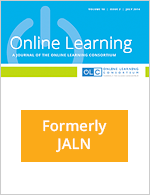Re-examining & Repositioning Higher Education: 20 Economic and Demographic Factors Driving Online & Blended Program Enrollments
Economic and demographic shifts in the United State are transforming higher education. With substantial reductions in state funding, increasing campus energy and operational costs, endowments generating reduced returns, and a national economic readjustment of unprecedented proportions, higher education must re-examine and reposition itself to meet new and emerging challenges. This...

